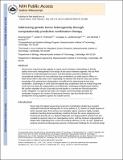| dc.contributor.author | Zhao, Boyang | |
| dc.contributor.author | Pritchard, Justin R. | |
| dc.contributor.author | Hemann, Michael | |
| dc.contributor.author | Lauffenburger, Douglas A | |
| dc.date.accessioned | 2014-09-04T19:37:06Z | |
| dc.date.available | 2014-09-04T19:37:06Z | |
| dc.date.issued | 2013-12 | |
| dc.date.submitted | 2013-12 | |
| dc.identifier.issn | 2159-8274 | |
| dc.identifier.issn | 2159-8290 | |
| dc.identifier.uri | http://hdl.handle.net/1721.1/89180 | |
| dc.description.abstract | Recent tumor sequencing data suggest an urgent need to develop a methodology to directly address intratumoral heterogeneity in the design of anticancer treatment regimens. We use RNA interference to model heterogeneous tumors, and demonstrate successful validation of computational predictions for how optimized drug combinations can yield superior effects on these tumors both in vitro and in vivo. Importantly, we discover here that for many such tumors knowledge of the predominant subpopulation is insufficient for determining the best drug combination. Surprisingly, in some cases, the optimal drug combination does not include drugs that would treat any particular subpopulation most effectively, challenging straightforward intuition. We confirm examples of such a case with survival studies in a murine preclinical lymphoma model. Altogether, our approach provides new insights about design principles for combination therapy in the context of intratumoral diversity, data that should inform the development of drug regimens superior for complex tumors. | en_US |
| dc.description.sponsorship | National Cancer Institute (U.S.) (NCI Integrative Cancer Biology Program (ICBP), Grant U54-CA112967-06) | en_US |
| dc.description.sponsorship | National Institutes of Health (U.S.) (NIH/National Institute of General Medical Sciences (NIGMS) Interdepartmental Biotechnology Training Program, 5T32GM008334) | en_US |
| dc.description.sponsorship | National Cancer Institute (U.S.) (Koch Institute Support (core) Grant P30-CA14051) | en_US |
| dc.language.iso | en_US | |
| dc.publisher | American Association for Cancer Research | en_US |
| dc.relation.isversionof | http://dx.doi.org/10.1158/2159-8290.cd-13-0465 | en_US |
| dc.rights | Creative Commons Attribution-Noncommercial-Share Alike | en_US |
| dc.rights.uri | http://creativecommons.org/licenses/by-nc-sa/4.0/ | en_US |
| dc.source | PMC | en_US |
| dc.title | Addressing Genetic Tumor Heterogeneity through Computationally Predictive Combination Therapy | en_US |
| dc.type | Article | en_US |
| dc.identifier.citation | Zhao, B., J. R. Pritchard, D. A. Lauffenburger, and M. T. Hemann. “Addressing Genetic Tumor Heterogeneity through Computationally Predictive Combination Therapy.” Cancer Discovery 4, no. 2 (December 6, 2013): 166–174. | en_US |
| dc.contributor.department | Massachusetts Institute of Technology. Computational and Systems Biology Program | en_US |
| dc.contributor.department | Massachusetts Institute of Technology. Department of Biological Engineering | en_US |
| dc.contributor.department | Massachusetts Institute of Technology. Department of Biology | en_US |
| dc.contributor.department | Koch Institute for Integrative Cancer Research at MIT | en_US |
| dc.contributor.mitauthor | Zhao, Boyang | en_US |
| dc.contributor.mitauthor | Pritchard, Justin R. | en_US |
| dc.contributor.mitauthor | Lauffenburger, Douglas A. | en_US |
| dc.contributor.mitauthor | Hemann, Michael | en_US |
| dc.relation.journal | Cancer Discovery | en_US |
| dc.eprint.version | Author's final manuscript | en_US |
| dc.type.uri | http://purl.org/eprint/type/JournalArticle | en_US |
| eprint.status | http://purl.org/eprint/status/PeerReviewed | en_US |
| dspace.orderedauthors | Zhao, B.; Pritchard, J. R.; Lauffenburger, D. A.; Hemann, M. T. | en_US |
| dc.identifier.orcid | https://orcid.org/0000-0003-4610-1707 | |
| mit.license | OPEN_ACCESS_POLICY | en_US |
| mit.metadata.status | Complete | |
